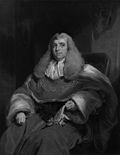The Court of Common Pleas, or Common Bench, was a common law court in the English legal system that covered "common pleas"; actions between subject and subject, which did not concern the king. Created in the late 12th to early 13th century after splitting from the Exchequer of Pleas, the Common Pleas served as one of the central English courts for around 600 years. Authorised by Magna Carta to sit in a fixed location, the Common Pleas sat in Westminster Hall for its entire existence, joined by the Exchequer of Pleas and Court of King's Bench.
The court's jurisdiction was gradually undercut by the King's Bench and Exchequer of Pleas with legal fictions, the Bill of Middlesex and Writ of Quominus respectively. The Common Pleas maintained its exclusive jurisdiction over matters of real property until its dissolution, and due to its wide remit was considered by Sir Edward Coke to be the "lock and key of the common law". It was staffed by one Chief Justice and a varying number of puisne justices, who were required to be Serjeants-at-Law, and until the mid 19th century only Serjeants were allowed to plead there.
As one of the two principal common law courts with the King's Bench, the Common Pleas fought to maintain its jurisdiction and caseload, in a way that during the 16th and 17th centuries was categorised as conservative and reactionary. Reaching an acceptable medium with the King's Bench and Exchequer of Pleas proved to be the downfall of all three courts; with several courts of near-identical jurisdiction, there was little need for separate bodies, and the superior courts of Westminster were merged by the Supreme Court of Judicature Act 1873 (36 & 37 Vict. c. 66) into a single High Court of Justice. With an Order in Council issued on 16 December 1880, the Common Pleas Division of the High Court ceased to exist, marking the end of the Court of Common Pleas. (Full article...)

Charles Abbott, 1st Baron Tenterden PC (7 October 1762 – 4 November 1832), was a British barrister and judge who served as Lord Chief Justice of the King's Bench between 1818 and 1832. Born in obscure circumstances to a barber and his wife in Canterbury, Abbott was educated initially at a dame school before moving to The King's School, Canterbury in 1769. He was noted as an excellent student, receiving an exhibition scholarship from the school in March 1781, when he matriculated at Corpus Christi College, Oxford. Here he was elected a fellow, and also served as a tutor to the son of Sir Francis Buller, which first made him consider becoming a barrister. He joined the Middle Temple in 1787, transferring to the Inner Temple in 1793, and was called to the Bar by the Inner Temple in 1796. Abbott was noted as an excellent barrister, earning more than any other during his time at the Bar, despite being considered unimaginative and a poor speaker. He was offered a position as a Justice of the Court of Common Pleas in 1808, which he turned down; he accepted the same offer in 1816, receiving the customary knighthood and being appointed a Serjeant-at-Law.
Three months after he started sitting as a judge he was transferred to the Court of King's Bench, where he was initially rather poor, being unfamiliar with the court's business. Within two years he showed "the highest judicial excellence", and when Lord Ellenborough had a stroke in 1818, Abbott was chosen to replace him as Lord Chief Justice. His reign at the head of the Court of King's Bench saw the court flourish, with strong justices and his own much-admired abilities. He was appointed to the peerage in 1827, sitting as Charles Abbott, 1st Baron Tenterden, and initially attended the House of Lords regularly. His opposition to the Reform Act 1832, which he claimed treated city corporations "with absolute contempt", led to his refusal to attend the Lords. Continuing to sit as Lord Chief Justice, Abbott gradually grew weaker, and finally fell ill halfway through a two-day trial. His disease baffled doctors, and he died on 4 November 1832 at his home in Queen Square, London. (Full article...)
A statute is a law or formal written enactment of a legislature. Statutes typically declare, command or prohibit something. Statutes are distinguished from court law and unwritten law (also known as common law) in that they are the expressed will of a legislative body, whether that be on the behalf of a country, state or province, county, municipality, or so on. Depending on the legal system, a statute may also be referred to as an "act." (Full article...)

Regulamentul Organic (Romanian: [reɡulaˈmentul orˈɡanik], English: Organic Regulation; French: Règlement Organique; Russian: Органический регламент, romanized: Organichesky reglament) was a quasi-constitutional organic law enforced in 1831–1832 by the Imperial Russian authorities in Moldavia and Wallachia (the two Danubian Principalities that were to become the basis of the modern Romanian state). The document partially confirmed the traditional government, including rule by the hospodars, and set up a common Russian protectorate which lasted until 1854. The Regulament itself remained in force until 1858. Conservative in its scope, it also engendered a period of unprecedented reforms which provided a setting for the Westernization of the local society. The Regulament offered the two Principalities their first common system of government. (Full article...)



